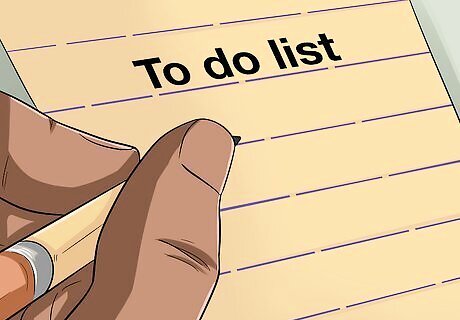
views
Why Is School Stressing Me Out?

Packed schedules, constant tests, and external pressures cause stress. 45% of high school students report feel stressed all of the time, and 48% of college students report experiencing moderate to severe stress. In short: your feelings are totally normal. It can feel so challenging, but you're not alone. These are some common reasons that students feel stressed: Oversheduling. Maybe you just have too many activities on your plate. If you feel like you never have time for rest, that can contribute to your stress levels. Lack of self-care. Do you have time for you? Everyone needs to spend time doing things they love—if you don't have that in your life, you might feel stress. Tests. When a single assignment could make or break your grade, it's natural to feel worried. If you have constant exams, that can increase your stress levels. Transitions. New schools, classes, and routines can create nervous feelings. If you're starting a new scheudle, that might bring more stress into your life.
How to Overcome School Stress

Stop and take a deep breath—everything's going to be okay. If you’re feeling overwhelmed, take a break from stressful thoughts. Breathe in, counting to 10 as you inhale. Then, do the same thing for your exhale—count to 10 as you release. Deep breathing can bring immediate relief and relaxation. This can help calm you down during homework, your test, or even right this second! Breathe in through your nose and out through your mouth. If it helps, place a hand on your stomach and feel its rise and fall. Really focus on your breaths as you go. Know that the best thing you can do right now is take a moment for yourself. If you’re having trouble calming down, remind yourself that this feeling will pass. A lot of the time, our biggest stresses work themselves out over time. If you can, visualize a time when that was the case for you.

For immediate relief, try relaxing visualizations. First, think of an image, scene, or memory that makes you feel totally at peace. Find a comfy position, close your eyes, take deep breaths, imagine yourself enjoying this relaxing space, and don't stop until you've relaxed. It may sound silly, but this trick is proven to work. Focus on engaging your five sense—for example: By the beach, the sound of waves, the deep blue sea, the feel of the sand on your feet, and the smell of sea spray. By the bonfire, the sound of cackling flames, the taste of s'mores, the warmth of the fire, the smell of smoke.

Listen to music. For immediate relief while studying or stressing, grab headphones and put on a playlist. This can actually alter your brainwaves and bring on relaxing feelings. If you’re someone who gets super nervous just before a test, enjoy slow, comforting tunes before you head in. Soothing sounds can reduce stress in the moment and help you feel powerful and calm. Native American, Celtic, and Indian music have been proven to be especially successful in reducing stress. Go for lower tempo music that you enjoy listening to, especially light jazz and classical music. Or, just listen to your faves! Your brain will release chemicals that’ll boost your mood—and that could help limit your stress, too!

Meditate. This can offer immediate and long-term relief for stress. The beauty of meditation is anyone can do it anywhere, anytime (like when you're stressed during a test!). Plus, beyond immediately boosting your mood and making you feel centered, it also lowers stress levels long term. Make meditation a regular habit. Even if you're pressed for time, dedicate a few minutes each day. Meditation helps you find a peaceful, positive perspective, even when school and grades feels overwhelming or chaotic. A free app (like Insight Timer) can help guide you through the practice. Learn meditation as a beginner, try meditation for stress specifically, or discover other tips to reduce anxiety through meditation.

Recite positive affirmations. Affirmations can help you feel empowered and optimistic. Speak to yourself out loud and even if it feels unnatural at first, remind yourself that this trick is proven to work. Instead of sugarcoating things, be honest with yourself. Look for the positives in your life, while focusing on your own strength and resilience: Instead of saying, “Everything is fine” or “I’m the best” (because this may not feel sincere!), remind yourself that you’re capable: “I can handle what life throws at me.” Remind yourself of times you’ve been strong in the past: “I’ve been through things harder than this, and I’ll make it through now, too.” Don’t ignore or devalue your own feelings: “It’s tough feeling like this, but that doesn’t mean this won’t pass. I can do this.”

Make a study schedule. Writing out everything you need to get done might feel like the last thing you want to do. Put it all on the page, though, and suddenly, your schoolwork might not feel so overwhelming. Block out time to study, to take breaks, and to take care of yourself. Plus, this can actually help you improve your grades, too! Creating specific windows of time for each task can make your workload seem a bit lighter. If you’re having trouble keeping up with a schedule or the timelines stress you out even more, go with a simple, satisfying to-do list. Make sure to schedule breaks regularly. If you’re having trouble balancing work and play, try 25 minutes of studying and 5 minutes of any activity you like. You might find that this helps you stay on task longer—and have more fun doing it!

Tackle one part of your homework at a time. Procrastinating can actually feel more stressful than taking action. Sometimes, the most stressful part about school actually comes right before we start working. Dive in, and you might find that things move faster and more easily than you'd expect. Don’t worry about tackling everything at once, just attack one task at a time. Start with something that you like—or even just something that you feel drawn to in the moment. This could be something simple, like writing an outline. Congratulate yourself when you do get something done. Finish your first assignment? That definitely calls for a little ice cream!

Celebrate and be kind to yourself. Put energy into loving yourself—not just aiming for high marks. By taking the time to really appreciate all of your successes (even the small ones!) you may feel less stressed, happier, and more resilient. And with that, you're more likely to earn higher grades in the future! Self-care, too, can be a great way to keep putting yourself first. Try to shift your focus from obsessing over what you "should" be able to do, to excitement over what you have done and could do in the future. Keep a journal and write down your little “wins” throughout the day. Everything from a grade you’re proud of to finding an outfit you love should be recorded. Try blocking out time in your schedule for the things that make you feel amazing. That could be time with friends, skateboarding, or watching reality TV. Take yourself out for a relaxing solo date. Get your nails done, get a massage, or shop at a store that you love, go see a fun movie, or enjoy a meditative activity, like golf.

Avoid comparisons. People compare themselves to others all day long, but they rarely draw fair comparisons. Have you noticed that when you compare yourself, it's to the best student in class? Try to remember that there will always be someone who struggles more than you do. When you do catch yourself drawing negative comparisons, challenge them: “I’m not bad at math, Nora is just really good at math.”

Get more sleep. Sleep deprivation causes stress—and stress makes it harder to sleep. With tests and homework, you might struggle to find the time for rest. Or worse, maybe worrying thoughts cause you to lay awake at night. Sleep may seem like the least pressing thing on your plate—but trust that it's important. Prioritize sleep, and you'll genuinely feel less stressed over time. The more sleep you get, the more alert you’ll feel. And the more alert you feel, the more you get done. And the more you get done—you get the picture! Try to wake up and go to sleep at the same time every day—even on weekends. A consistent schedule will promote healthy sleep habits. Take a hot bath or shower directly before you head into bed. When you get out and your temperature drops, you’ll feel sleepier faster. If, after 20 minutes of attempting to sleep, you’re wide awake, try turning on the lights and enjoying a relaxing activity (like reading) until you feel sleepy. Just stay away from anything on screens!

Exercise. Physical activity reduces stress and sharpens the mind. Actually, it boosts mood, raises energy, and helps with sleep, too (which, in turn, lowers stress even more!). Plus, the benefits are immediate and also build up over time. Some people feel stressed about the idea of working out, but there’s good news: low to moderate exercise is enough to lower stress. Try starting with something simple and fun, like a long walk. Pull together an awesome playlist or a happy podcast to keep you entertained. Do yoga to increase mindfulness, find a positive mindset, and lower stress levels. If you’re pressed for time or don't have a gym membership, do bodyweight exercises from home. Or, just do an exercise you genuinely love. Swimming, bike rides, running, dancing, and rock-climbing are all excellent choices!

Eat well. Without key nutrients, your body might struggle to handle stress. On the whole, eating healthy foods and avoiding excess sugar can definitely reduce stress—but sometimes that’s easier said than done. If the idea of sticking to strict diet stresses you out, focus on eating more often and adding in powerful nutrients where you can instead: Snack regularly. By chowing down on small, healthy snacks consistently throughout the day, you’ll reduce stress and become more alert. Eat more omega-3 fatty acids. Try walnuts, flax seeds, and fish oil. Incorporate more veggies into your diet. Try to add spinach to that omelette or eat a side salad with your dinnertime burger. Include more fiber in your diet. Beans, nuts, and oatmeal can all raise concentration and limit stress.

Spend time in nature. The great outdoors can reduce stress hormones. It’s like nature created a the perfect antidote to the stress of exams, projects, and homework. Yes, by being exposed to the outdoors regularly, you’ll actually feel less stressed going forward. Find ways to incorporate a few minutes outdoors each day. Try some of these helpful tips: When you can, walk or bike to where you need to go instead of driving. Do an activity you were already planning on doing (like reading, homework, drawing, etc.) in a gorgeous, grassy field outside. Try combining your time in nature with another helpful, stress-reducing technique, like meditation or music listening.

Say “no” when you need to. Your health and happiness should be your top priority. If you always feel run ragged, it might be time to take some things off your plate. When your group project team asks you to take on extra work, turn them down. If your parents pressure you to start a new sport, explain how you’ve been feeling about school stress. You’re still the same strong, capable, hard-working person, even when you recognize that you need a break. If anything, it takes bravery to say enough is enough! Prioritize what’s most important to you. If you want to be an engineer, keep putting time into math and science—but maybe take football off of your schedule. Take some time to reflect. Is there one thing that’s causing a huge amount of your stress—and if so, how important is it to you? Is that one AP class that's creating most of your stress really worth it? Drop it, and maybe you could dedicate more energy to more of your schoolwork.

Reach out for help. Teachers, parents, and friends can offer comfort and support. When you're struggling, you may be tempted to keep things under wraps—you might even be embarrassed share. Ask for help, though, and you might find your biggest problems are easier to solve than you'd thought. You don’t deserve to feel this stress all on your own—so talk to someone you trust. If you’ve been doing your best in school but just can’t seem to catch a break, talk to your teacher about the issue. If you feel like your schedule is way too difficult to handle on your own, explain your feelings to your parents. If you know you just need to vent or unload a bit, reach out to a friend that you can trust.

Set up an appointment with a therapist. Professionals can offer so much relief, even from serious stress and anxiety. If you’ve been struggling with school-related (or general) stress for a long time, talk to your parents about making an appointment with a therapist. Or, try reaching out to your school’s counselor or mental health services department. This stress will pass. So often, all you have to do is find that balance or trick that helps you feel better (which you 100% deserve, by the way). A professional can help guide you while you navigate school stress. And they can remind you that even though it's great that you're so invested in school, no grade is worth risking your mental health. At the end of the day, the most important thing is that you are taking care of you!



















Comments
0 comment